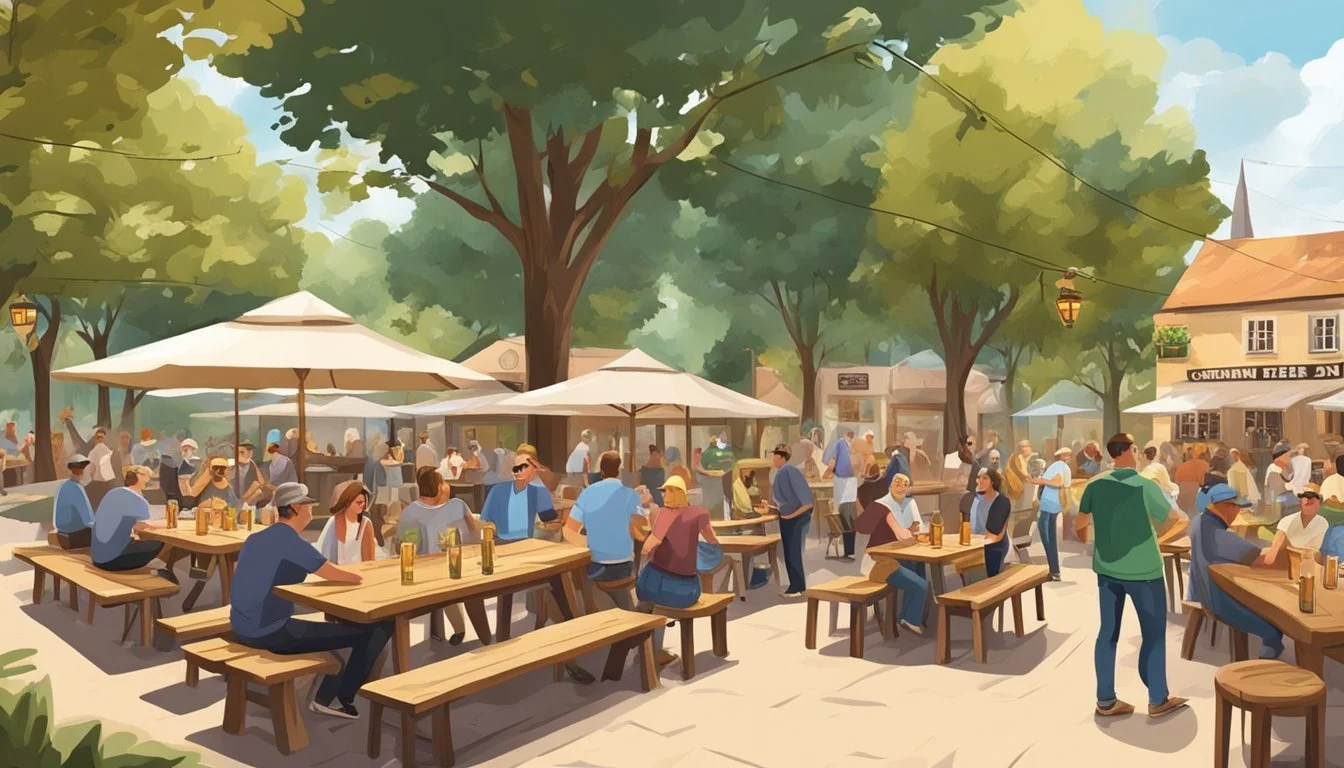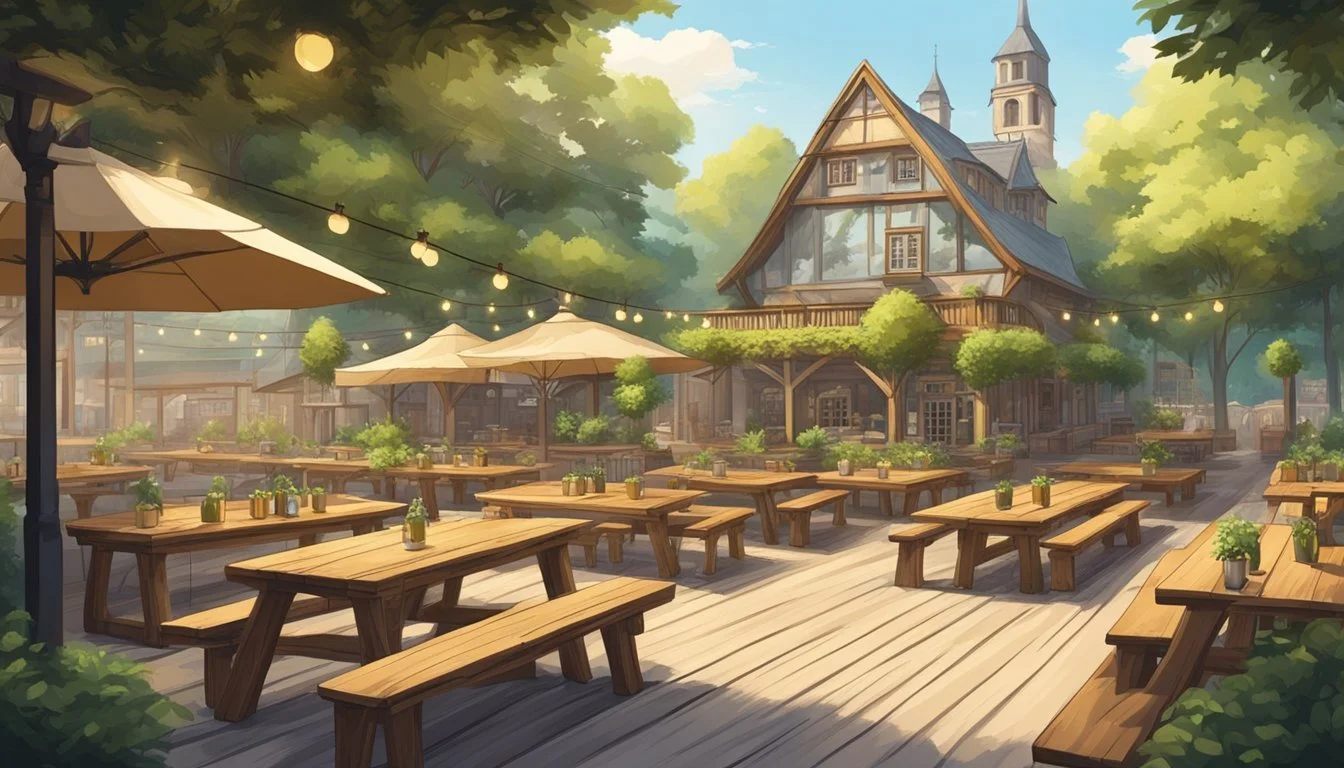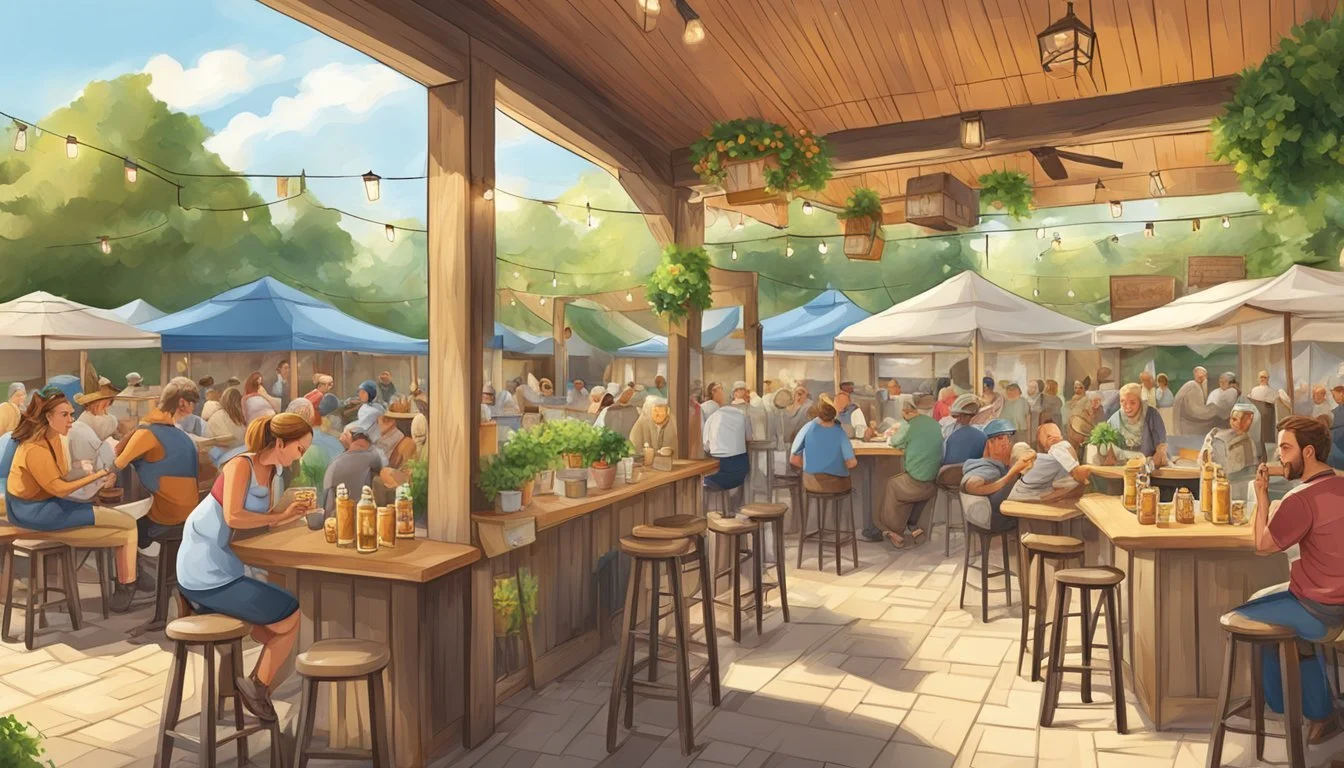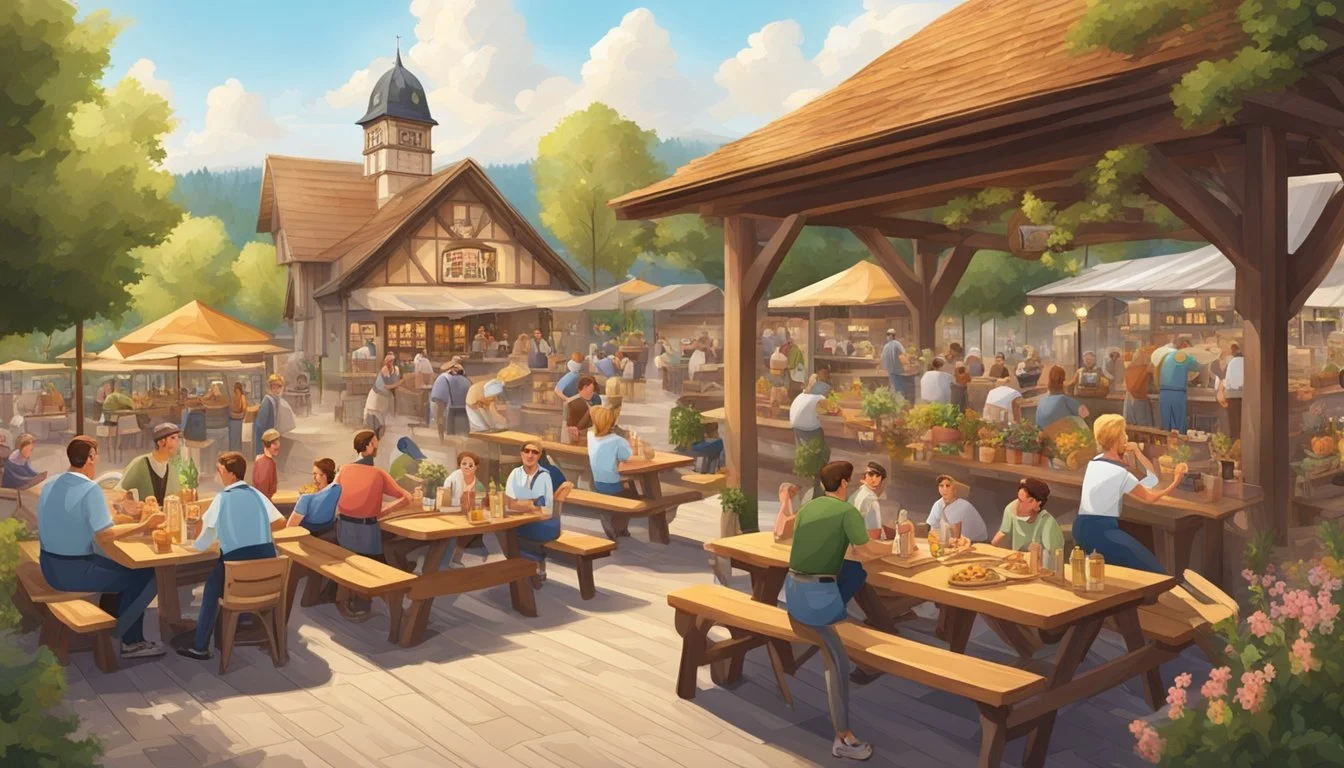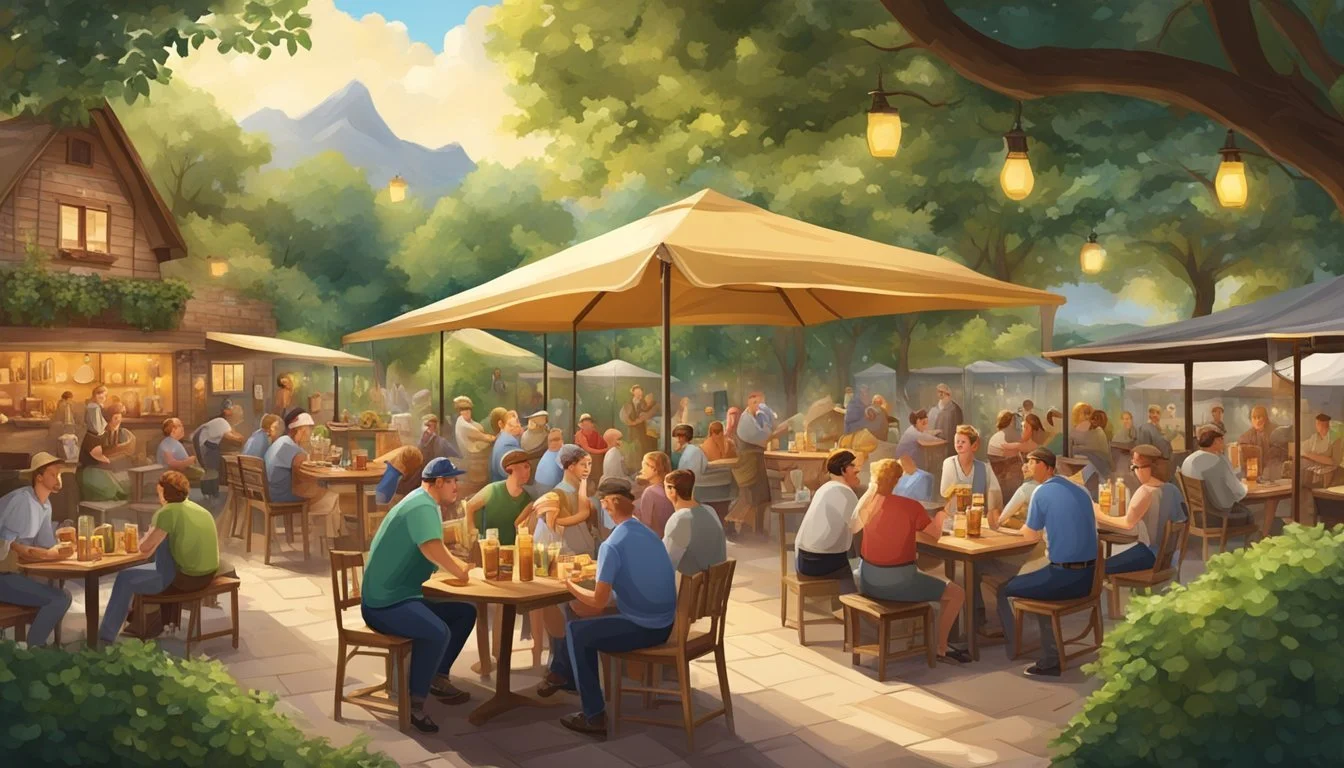German Texan Beer Gardens
A Guide to Traditional Food and Drinks
The fusion of German and Texan cultures has brewed a rich tradition of beer gardens across the Lone Star State. These convivial gathering places are steeped in a history that dates back to the early 1800s when German immigrants began settling in Texas. Drawing on their heritage, these settlers brought with them a love for beer and communal dining, laying the groundwork for beer gardens that meld German tradition with Texan hospitality.
Today, German Texan beer gardens are social hubs where people come to enjoy a slice of Gemütlichkeit— a term that encompasses a feeling of warmth, friendliness, and good cheer. Visitors can expect to find an array of traditional German fare, including handcrafted breads, house-cured meats (What wine goes well with cured meats?), and, of course, a selection of local and international beers. These establishments often sport long communal tables, encouraging patrons to sit side by side with neighbors and strangers alike, fostering a sense of community over a pint of beer and hearty food.
At the core of the beer garden experience is a culinary journey that features German classics like bratwurst sausages, pretzels, and schnitzels, often with a Texas twist. Sausages might be smoked using local woods, and pretzels can come with unique dips that blend German and Texan flavors. Pair these offerings with a curated beer menu that features a thoughtful mix of local Texan brews and German imports, and you have a recipe for a memorable cultural experience that continues to thrive in the heart of Texas.
History of German Texan Beer Gardens
German immigrants brought their beer garden tradition to Texas in the 19th century. These early Texans of German descent sought to recreate a piece of their homeland's culture in their new surroundings.
Central Texas cities like Fredericksburg and New Braunfels became the homes of these communal spaces, reflecting German roots and social customs. The areas known for their lush scenery and favorable climates became natural settings for beer gardens, a concept deeply embedded in Bavarian lifestyle.
The first known beer garden in Texas was Scholz Garten, opened in 1866 by German immigrant August Scholz. It quickly became a social hub for German settlers where one could find traditional fare alongside freshly brewed beer. Scholz Garten's longevity marks it as not just an iconic establishment in Texan history but also as America's oldest beer garden in continuous operation.
A typical German Texan beer garden offered more than just beer; they provided a space for music, dancing, and the sharing of news, further solidifying the sense of community among German migrants. The design often mimicked that of their Bavarian counterparts, with open air seating shaded by trees, fostering a relaxed atmosphere.
Key Features of German Texan Beer Gardens Communal seating German-inspired food offerings Entertainment like music and dancing Authentic German beer styles
By maintaining their cultural practices, German Texans not only preserved their heritage but also contributed to the state's diverse cultural landscape. The influence of the beer garden continues to be a testament to the steadfast presence of German culture in the region.
Architecture and Design of Beer Gardens
This section explores how traditional German architecture subtlety imprints itself on Texan beer gardens and highlights specific landmarks to visit in Texas.
Influence of German Architecture
Traditional German beer gardens, known as Biergartens, are much celebrated for their open-air environments and communal atmosphere. In Central Texas, towns like Fredericksburg and New Braunfels, with their German heritage, have designed beer gardens that often feature long communal tables fashioned from sturdy wood. These tables promote a sense of togetherness and echo the German custom of gathering with family, friends, and even strangers. The architecture of the buildings often features timber framing and gabled roofs, reminiscent of Bavarian styles. The shade, essential to the patron's comfort, traditionally comes from chestnut trees in Germany, but Texas beer gardens adapt by using native tree species capable of thriving in the local climate.
Landmark Beer Gardens in Texas
Landmark beer gardens in Central Texas often honor their German Texan roots through location and design. A notable example is the biergarten in Fredericksburg, a town where German influence is intrinsic to its identity. The beer gardens here might not feature the iconic chestnuts of Berlin's gardens, but they stay true to the spirit with ample shady spaces. In Boerne, another Central Texas town with German lineage, visitors find beer gardens that combine rustic charm with the wide-open aesthetic of the Texas Hill Country. These spaces owe their casual and inviting nature to their layout, incorporating elements like open courtyards and live music stages, framed by the area's natural beauty.
Traditional German Fare in Texan Beer Gardens
Texan beer gardens offer a rich array of German culinary traditions, serving authentic dishes that range from savory sausages to sweet pastries, while condiments like tangy sauerkraut accentuate the flavors. These venues combine the convivial atmosphere of Munich’s Oktoberfest-style gardens with Texan hospitality.
Savory Delights
The savory food served in these beer gardens draws heavily on German cuisine (What Wine Pairs Perfectly With German Cuisine), with sausages (Wurst) being a staple offering. Patrons might find a selection of Bratwurst, Weisswurst, and Knackwurst, often accompanied by generous helpings of sauerkraut and warm potato salad (Kartoffelsalat). Another favorite is the iconic schnitzel, which can come in varied forms, including the duck schnitzel, noted for its crispy coating and tender meat. Additionally, pretzels, twisting into various shapes and sizes and sometimes filled with cheese or paired with mustards, are a common sight. Rounding out the savory menu might be a comforting beef stew, (What wine goes well with beef stew?) slow-cooked to perfection with a blend of spices typical of the region's fare.
Featured Savory Items:
Sausages (Bratwurst, Weisswurst, Knackwurst)
Sauerkraut
Potato Salad (Kartoffelsalat)
Schnitzel (with duck as a special variety)
Pretzels (Cheese-filled variants available)
Beef Stew
Sweet Treats
Desserts take on a decidedly German influence, with beer gardens often serving items such as apple strudel or the lesser-known but equally delicious Kaiserschmarrn, a shredded pancake that combines the fluffy texture of a pancake with the caramelized sugar of a dessert. Adding to this sweet selection might be a range of pastries or cakes imbued with fruits, nuts, and spices that evoke the flavors of German recipes.
Popular Sweet Offerings:
Apple Strudel
Kaiserschmarrn
Fruit and Nut Pastries
Popular Condiments
No German dish would be complete without its traditional condiments. Mustards ranging from mild to spicy provide a kick to sausages, while apple sauce is commonly served with potato pancakes (Reibekuchen). Red cabbage, often braised with spices like cloves and simmered with apples for sweetness, is both a condiment and a side. These accompaniments are key to enhancing and complementing the various flavors found in the food served.
Traditional Condiments:
Mustards (sweet, spicy, stone-ground)
Apple Sauce
Braised Red Cabbage
The German Texan beer gardens carry on a heritage of German culinary tradition, merged seamlessly with the local customs, and ensure that the German beer garden experience remains an integral part of Texas's diverse food scene.
Authentic German Beers and Breweries
Texas hosts a rich tapestry of traditional German beers and breweries, reflecting a history intertwined with German culture. The state boasts a variety of popular German-style beers and innovative local breweries that carry on this legacy.
Popular German Beer Styles in Texas
Pilsner: A light, golden lager with a crisp, refreshing taste. Pilsners in Texas often feature a balanced hop profile and a smooth, clean finish.
Hefeweizen: Known for its cloudy appearance, this wheat beer delivers notes of banana and clove, offering a light and effervescent drinking experience.
Kölsch: Originating from Cologne, the Kölsch beer found in Texan breweries is a clear, top-fermented beer with a bright, straw-yellow hue, prized for its drinkability.
Dunkel: This Munich-style dark lager presents a rich, malty flavor profile with hints of chocolate and caramel.
Radler: Combining beer with fruit soda or lemonade, the Radler is a thirst-quenching, low-alcohol option, perfect for hot Texas days.
Local Breweries and Small-Batch Innovations
Small-Batch Breweries: Texas brewers have embraced small-batch brewing, allowing them to experiment with traditional recipes and new flavors, while also focusing on quality and craftsmanship.
Altstadt Brewery: Located in Fredericksburg, it embraces traditional German techniques and offers a range of authentic beers, including lagers and ales, brewed in accordance with the Reinheitsgebot, the German Beer Purity Law.
Easy Tiger: While known as a bakery and beer garden, Easy Tiger also features a fine selection of authentic German beers, providing patrons with a taste of Germany right in the heart of Texas.
Oktoberfest Celebrations: Many breweries in Texas host Oktoberfest events, celebrating German beer culture with special brews, traditional fare, and plenty of family-friendly activities.
Wineries and Bier Gardens: The fusion of German beer gardens and Texan wineries provides unique venues where both beer enthusiasts and wine aficionados can enjoy the scenic beauty of Texas while savoring their preferred beverages.
Cultural Events and Community Gatherings
In the heart of Texas, German-Texan heritage thrives through vibrant cultural events and community gatherings at beer gardens, where families and friends share traditional fare and celebrate their roots.
Oktoberfest Celebrations
Oktoberfest, the quintessential German festival, finds a second home in Texas. The state boasts some of the most authentic Oktoberfest celebrations, particularly in towns like Fredericksburg and New Braunfels, where Gemütlichkeit, or a sense of coziness and belonging, is palpable. Guests can enjoy bratwursts, pretzels, and a variety of beers in a Bavarian-themed setting. These festivals are a family affair, often featuring petting zoos and face painting for children as well as beer for the adults.
Music and Entertainment
The sound of live music, encompassing polkas, waltzes, and Texas's very own Willie Nelson's tunes, is integral to beer garden festivities. These events offer a platform for both local and international musicians to entertain an intergenerational crowd. During weekly Stammtisch, or regulars' table meetings, music serves as a backdrop to community engagement and the enjoyment of German-Texan culinary staples like barbecue and beer.
Weekly and Annual Traditions
Each beer garden in Texas Hill Country tells a story of weekly and annual traditions that keep the German culture vibrant. Annual picnics and barbecues in the serene outdoors are a nod to the regions' German heritage. Traditions extend to weekly gatherings where residents celebrate with Bavarian beer and plates piled high with hearty, traditional fare. It's here that Texas's famous hospitality meets European tradition, embodying the unique character of German-Texan communities.
Integration of German and Texan Cultures
The intermingling of German and Texan cultures has birthed a unique fusion of cuisines and celebrations, all while maintaining distinct identities. German immigrants to Texas brought with them their own customs, culinary practices, and communal beer gardens, which have been embraced and adapted by the local Texan population.
Fusion of Cuisines
German-Texan Gastronomy: An unexpected yet harmonious blend is evident in Texan eateries like Krause's Cafe, where the convergence of German cuisine with Tex-Mex flavors can be tasted. Traditional German dishes like sauerkraut find new interpretations when mixed with Tex-Mex staples, generating a cross-cultural culinary experience.
Sauerkraut & Tex-Mex: A crisp topping on tacos
Obatzda: Enriched with Texan spices, this Bavarian cheese delicacy becomes a sought-after dip in local food trucks
Bratwurst: Served within tortillas, marrying the brat with the burrito
Shared Celebrations and Attire
Festivals and Fashion: Shared celebrations are vivid showcases of cultural integration, particularly in the Texas Hill Country, known for its rich German roots. Here, annual events unite the traditional German "Prost!" with the hearty Texan cheer, merging not just the beer but also the attire.
Oktoberfest: Adopting King Ludwig I's tradition with Willie Nelson's country flair
Lederhosen and Cowboy Boots: A sartorial blend worn by celebratory goers
German biergartens have transformed into communal beer gardens where Texans of all backgrounds gather, creating a space that reflects both the old and the new. These beer gardens maintain the German respect for quality beer while often featuring live performances by local country musicians.
Visiting German Texan Beer Gardens
When exploring German Texan beer gardens, visitors can expect to immerse themselves in a blend of traditional German and Texan hospitality. These establishments often feature hearty German cuisine, communal seating, and a selection of local and imported beers.
Travel and Tourism
German settlers have left a significant mark on various parts of Texas, especially in areas like Fredericksburg, Boerne, and New Braunfels. In these towns, beer gardens (or 'biergartens') are cultural landmarks where families and friends gather. Travelers will find themselves welcomed at long, communal tables, reminiscent of Munich's famed biergartens.
Fredericksburg, nestled in the Texas Hill Country, is particularly notable. This town melds agriculture, wineries, and German heritage. Visitors are advised to experience the Sophienburg Museum to understand the history of German migrants before enjoying a cold 'Ein Mass' (one-liter beer mug) at a local biergarten.
Local Recommendations:
German Cuisine: Patronizing a biergarten, guests should try the potato salad, a staple that complements various sausage dishes.
Beer Selection: A true German beer garden will offer a wide wine list and beers that adhere to the Reinheitsgebot, or German Purity Law.
Landmarks and Activities: Besides the biergartens, Texas Hill Country offers antique shops and outdoor activities, making it a rich area for both cultural and recreational tourism.
Local Recommendations
For a genuine experience, visitors should consider local venues that prioritize traditional fare made with local ingredients. Recommendations include:
Enjoy the vibrant atmosphere of a biergarten in New Braunfels while indulging in a hearty German meal.
Explore Boerne, where a stroll through the town's antique shops can be paired with a relaxing break at a local beer garden.
Don't miss the annual Wurstfest in New Braunfels for a multi-day celebration of German culture, food, and beer.
Through these venues and events, one can experience the hospitable spirit that German settlers have instilled in these Texan communities.
Legacy and Future of German Texan Beer Gardens
German Texan beer gardens are enduring symbols of the rich cultural tapestry brought to Central Texas by German settlers. These vibrant social hubs have been part of the Texas fabric since the mid-19th century when migrants sought to recreate the communal atmosphere of Munich's famed Bavarian gardens.
Historically, beer gardens like Scholz Garten in Austin, founded by a German immigrant, became a place where politics, music, and family gatherings converged. Krause's Cafe is another institution that echoes these German roots, providing a space where traditions are preserved and celebrated.
In recent years, these spaces have continued to serve as important points of connection. Families come together to enjoy not only a cold beer but also the traditional German fare – a testament to the legacy of the original settlers. Beer gardens remain entwined with community life, often hosting local talents such as Willie Nelson, who bridge the old with the new.
The Sophienburg Museum sheds light on this history, ensuring the stories of the past are kept alive for future generations. Born out of a desire to maintain a connection to their homeland, these beer gardens have been integral in fostering a sense of community amongst diverse groups.
Moving forward, beer gardens in Central Texas face the challenge of respecting tradition while adapting to modern expectations. Yet, their resilience and adaptability suggest a bright future, one where they continue to be a cornerstone of cultural and social interaction in German Texan communities.


